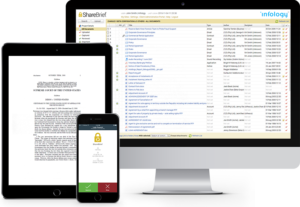First, what’s a “deal book?”
Maybe you have not heard the term, “deal book.” That’s a comprehensive piece on a  company for use by a buyer in determining fit. A “deal room” is a cloud-based or physical space dedicated to storing the massive amounts of data to be used in due diligence by a buyer, lender or by an investor.
company for use by a buyer in determining fit. A “deal room” is a cloud-based or physical space dedicated to storing the massive amounts of data to be used in due diligence by a buyer, lender or by an investor.
Your data room and its contents
Data rooms contain access to or copies of all significant contracts with suppliers, customers, consultants, and others. All corporate governance documents, from incorporation articles to minutes of all meetings of the board are maintained in the deal room. Up-to-date insurance policies, leases, financial documents and schedules such as fixed assets are copied here. Copies of intellectual property filings such as patents, copyrights and trademarks, all owned URL addresses, and even copies of source code, may be resident in the deal room, dependent upon the type of buyer. Current documents relating to any lawsuits by or against the company are maintained there as well.
Who will use it and when?
In this day of electronic record-keeping, access to the deal room is available remotely by a buyer with appropriate access, saving the long and expensive personal visits by lawyers, accountants and others to the seller’s facility. Well-maintained deal rooms enhance a company’s image with a buyer, quicken the pace of the deal, help maintain secrecy from employees while due diligence is in process, and lower the stress levels of all parties during the process.
When to start a data room?
[Email readers, continue here…] But maintaining such an electronic or physical facility is time-consuming and costly. The question is whether to start this exhausting process early in the life of a corporation, or rush to complete it when a deal is identified or the run to a sale is imminent.
 Because deal rooms have multiple applications, the best advice is to begin the process right after incorporation and make keeping it current a continuing job of your financial senior management. Whether it means copying physical printouts and creating volumes in three-ring binders or scanning documents and creating electronic folders, incremental additions are much easier to make than an all-out run at the finish.
Because deal rooms have multiple applications, the best advice is to begin the process right after incorporation and make keeping it current a continuing job of your financial senior management. Whether it means copying physical printouts and creating volumes in three-ring binders or scanning documents and creating electronic folders, incremental additions are much easier to make than an all-out run at the finish.
The payoff
Bankers, investors, strategic partners, and ultimately your buyer or even attorneys providing opinions for an IPO, will all be most impressed by your thoughtful early management decision to make their lives easier and their job more productive.

This amplifies the importance of record filing systems. Filing can seem boring. Bringing buyers,investors, attorneys, bankers into the picture–communicating with powerful people outside the company–brings new life into record keeping. The language of “Deal Books” and “Data Rooms” brings clarity, aliveness and even pride to well organized records. I impact on the financial value of the company is powerfully positive.
Another great blog, Dave! Given many of us had to pull together this type of information to get PPP loans (at least we did), it would have been genuinely helpful to have it all in one place. Thanks to the hoops our bank made us go through, now we have a lot of information to start filling our Date Room! m
Thanks for this reminder about keeping good data trails. I have a private server to backup my data with the option to allow private access. it’s calling me to update my files now. THX!
DP,
Backing up the system is like brushing your teeth. Your dentist can tell if you aren’t doing it every day. Or when changes can’t lost forever if not daily.
But this insight is about adding the data that tells the story of your enterprise from inception through present in an isolated file folder that is located elsewhere (Dropbox, SugarSync, or even on your server (if you can grant access only to a single folder,) and transferring legal and financial data needed by others such as those listed in the article above.
It means scanning to PDF, screen scraping, copying, and sometimes creating Excel, Word, and other files to memorialize these. (Take for example, your State and city business licenses, sometime just a few bytes on someone else’s server… And if you are doing this for yourself, not for a company, think of birth, marriage and other legal certificates including driver’s licenses, copies of wills and trusts, list of assets, financial statements including balance sheets. In those cases, you can grant access to only a few files inside the “private” folder to those in need (trust attorneys, banks, private lenders and more.) OK?
-Dave